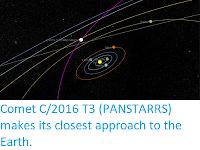Comet 46P/Wirtanen will make its closest approach to the Earth on Sunday 16 December 2018, reaching a distance of 0.077 AU from the Earth (7.7% of the distance between the Earth and the Sun, or 11 588 000 km). At this distance the comet will be naked eye visible, having a magnitude of 3, although it will be better seen with a telescope or binoculars, close to the belt of Orion, making it easy to find for even amateur astronomers, and easily visible from both hemispheres.
Comet 46/Wirtanen seen from Alberta, Canada, on 6 December 2018. Alan Dyer/Amazing Sky.
46P/Wirtanen was discovered on 17 January 1948 by Carl Wirtenen, working at the Lick Observatory in .
The name 46P/Wirtanen implies that it is a periodic comet
(P/) (all comets are, strictly speaking, periodic since they all orbit
the Sun, but those with periods longer than 200 years are considered to
be non-periodic), that it was the 46th comet (comet 3) discovered and that it was
discovered by the Wirtenen.
The orbit and current position of Comet 46P/Wirtenen. The Sky Live 3D Solar System Simulator.
46P/Wirtenen has an orbital period of 1987 days (5.44 years) and a
highly eccentric
orbit tilted at an angle of 11.7° to the plain of the Solar System, that
brings it from 1.06 AU from the Sun at perihelion (106% of the distance
between the Earth and the Sun);
to 5.13 AU from the Sun at aphelion (5.13 times as far from the Sun as
the Earth or roughly the distance at which Jupiter orbits). As a
comet with a period of less
than 20 years with an orbit angled at less than 30° to the plane of the
Solar System, 46P/Wirtenen is considered to be a Jupiter Family Comet.
See also...
Follow Sciency Thoughts on Facebook.








